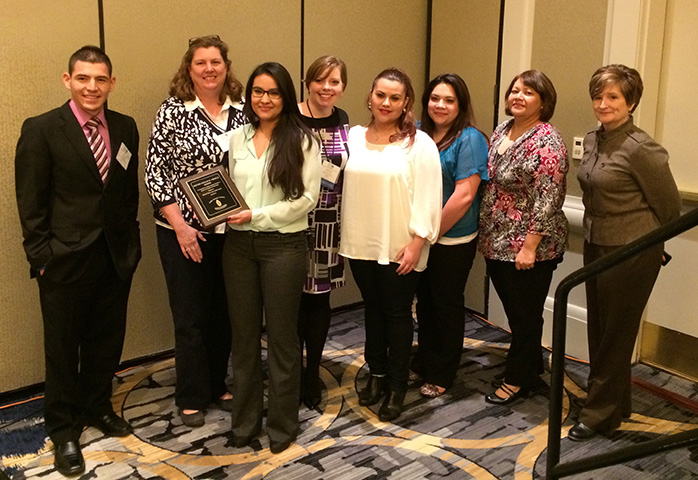Community and Migrant Health Center: Quincy Community Health Center | Quincy, Washington
Contact: Mary Jo Ybarra-Vega, Migrant Health Coordinator | www.mlchc.org/quincy
Every year Health Outreach Partners (HOP) presents the Sister Cecilia B. Abhold Award to three organizations demonstrating excellence in health outreach services to migrant and seasonal farmworkers. This year, HOP was excited to present the Sister Cecilia B. Abhold Award for the West Coast Stream to Quincy Community Health Center (QCHC) at the 2014 Western Forum for Migrant and Community Health in Seattle, Washington.

(QCHC receiving the Sister Cecilia B. Abhold Award)
QCHC serves primarily Latino patients living in rural areas, including many farmworkers. This hard-to-reach population faces many barriers to enrollment into affordable health insurance, including language and literacy, transportation, familiarity with the healthcare system, and migration concerns. When open enrollment into the affordable healthcare insurance marketplaces began in October 2013, QCHC leveraged its status and trust in the community to spearhead a targeted outreach effort to maximize enrollment.
In order to prepare for the start of open enrollment, QCHC began planning their enrollment strategy over a year in advance, with inclusion from leadership across all areas of the health center. Early on, a portion of existing outreach efforts included educating the community about the Affordable Care Act (ACA) and open enrollment. Outreach workers supplied information in the field and recorded questions and doubts from community members, which were brought back to the health center team. This allowed QCHC to address questions and doubts beforeenrollment began, thereby preparing staff to handle a variety of situations that could arise during the enrollment process. One such outreach event took place at Quincy’s annual Farmworker Consumer Awareness Day in September 2013. At the event, QCHC collected a list of over 300 individuals in need of enrollment assistance.
QCHC used the following strategies to overcome obstacles to providing application assistance:
- Hiring Trusted Outreach Workers: Many patients had doubts or felt intimated by the application process. In order to build trust and confidence, QCHC used current staff that patients and other community members recognized. Approximately half of the In-Person Assisters were already seasoned promotoras at QCHC, and the remaining were trained from other departments within the health center.
- Expanding Clinic Hours: Many farmworkers work long hours, and are not able to make application assistance appointments during the day. The enrollment staff expanded their evening hours in order to serve a higher volume of people, in addition to accommodate farmworkers who often work long hours.
- Addressing Documentation Concerns: The complicated legal and documentation issues facing migrant and immigrant populations can cause delays and dead-ends in the enrollment process. QCHC gained approval to have an employee from the Washington Department of Social and Health Services on-site twice a week who was able to access certain records and address documentation issues.
- Creating Spanish Language Materials: The majority of patients QCHC serves are native Spanish-speakers, yet early information on the ACA only existed in English. QCHC connected the Washington Association of Community and Migrant Health Centers with partners to create materials in Spanish. Then, QCHC piloted and field-tested the information during outreach activities, helping refine the materials which are now used state-wide.
Health center leadership and coordinators meet monthly to discuss issues that have arisen and adapt outreach and enrollment efforts accordingly. According to Migrant Health Coordinator Mary Jo Ybarra-Vega, “We really need to meet every month. Our success has been based [evaluation results].†The outreach team continues to track and evaluate all outreach activities, not only those with enrollment events. QCHC’s enrollment success is due in large part to their strong presence in the community through past outreach efforts—efforts they plan to continue leading up to future enrollment periods.
HOP tip: When possible, contact individuals prior to their enrollment appointment and record their specific concerns. This gives ample time to reach out to the appropriate departments and answer questions beforehand, thereby streamlining the enrollment process and avoiding issues that often arise during the appointment.
This publication was made possible by grant number U30CS09743 from the Health Resources and Services Administration, Bureau of Primary Health Care. Its contents are solely the responsibility of the authors and do not necessarily represent the official views of HRSA.
